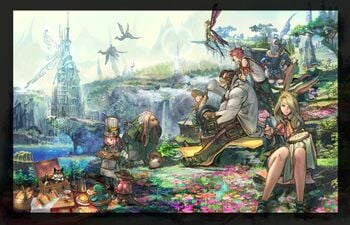Crafting



![]() There are eight crafting classes in Final Fantasy XIV, also known as Disciples of the Hand or DoH, with each job specializing in crafting, repairing, melding and desynthesizing specific item types, as well as producing vanity items, such as glamours and furniture for houses and apartments.
There are eight crafting classes in Final Fantasy XIV, also known as Disciples of the Hand or DoH, with each job specializing in crafting, repairing, melding and desynthesizing specific item types, as well as producing vanity items, such as glamours and furniture for houses and apartments.
The 8 Disciples of the Hand classes are Carpenter, Blacksmith, Armorer, Goldsmith, Leatherworker, Weaver, Alchemist and Culinarian.
To become a Disciple of the Hand, players require at least one level 10 Disciple of War or Magic. If eligible, visit the guild associated with the desired craft to begin your very first job quest. It is recommended to level most or all of the classes together as they feed each other with intermediate materials and can share all gear besides tools.
In addition to crafting, these classes provide additional functions:
- Repair: To repair any item yourself, you'll require a certain level in a corresponding crafting class. This applies to every piece of equipment, craftable or not. You don't have to switch to the class in order to repair the item. Unlike NPC repairs, this can restore condition up to 199%. The higher the level of the equipment, the higher the grade of Dark Matter is required to do this.
- Materia Melding: This likewise requires a certain level in the corresponding crafting class. Players can "Request Meld" from other players with a sufficient crafting level, but may also be charged for the service. This can only be performed while the class is active. This feature is unlocked through the quest Waking the Spirit with a crafting class at level 19.
- Desynthesis: Taking unneeded equipment, furnishings, and fish apart to potentially salvage some of the materials and even find rare materials or glams. This has its own skill level system. Culinarians can desynthesize most fish instead of equipment. You don't have to switch to the class to do this. If the Desynthesis skill is too low compared to the Item Level of the item, its not possible to receive rare items from the drop table, and some equipment can't be desynthesized at all. This feature is unlocked through the quest Gone to Pieces with a crafting class at level 30.
Official Crafting Guide on Lodestone
Using the class:
- Crafting classes are used the same way as combat classes and must be switched to by using the gear set feature or by manually equipping a primary tool in the main hand from the armory chest. Equipment with crafting stats can be bought or crafted for every equipment slot except for the Soul Crystal. (The Soul Crystal equivalent for crafters is acquired through the Specialist System.) All equipment can be used across all the crafting classes except for the primary and secondary tools, which are unique to each, and class-specific Artifact Armor.
Classes
Guild location: New Gridania.
Carpenters excel at the production of wooden materials, furniture and equipment used by many classes in the game, such as clogs, bows, staves and polearms.
Guild location: Limsa Lominsa Upper Decks.
Blacksmiths specialize in the refining of metals and the production of main-hand and off-hand equipment, such as swords, axes, scythes, musketoons, and more.
Guild location: Limsa Lominsa Upper Decks.
Armorers excel at shaping metals and ores into equipable armor - such as chainmail, ring mail, scale mail and plate body armor, used by multiple classes in the game.
Guild location: Ul'dah - Steps of Thal.
Goldsmiths bend metals and gems into fashionable accessories and bejewelled weaponry. Many classes desire their fineries, such as rings, earrings, necklaces, staves and sceptres.
Guild location: Old Gridania.
Leatherworkers prepare hides, pelts and furs from Eorzea's most notorious monsters into leather-based armor and accessories desired by multiple classes in the game.
Guild location: Ul'dah - Steps of Thal.
Weavers convert fabrics and fibres into comfortably light armors and accessories, such as robes, ribbons, shirts and pantaloons that are wearable by multiple classes in the game.
Guild Location: Ul'dah - Steps of Thal.
Alchemists are masters of powders and potions – grinding and blending materials to produce useful consumables, elixirs, inks, wands, and grimoires.
Guild location: Limsa Lominsa Upper Decks.
Culinarians utilize various ingredients to create hearty and emboldening meals. Players can consume food to receive temporary buffs to a variety of attributes, including EXP buffs – perfect for the wandering adventurer.
Unlike all the other jobs which strongly co-depend (on each other and) on Botany and Mining for their ingredients, the Culinarian strongly co-depends on Botany and Fishing.
Crafting Basics
Once you have unlocked a crafting job, all recipes related to that job can be viewed using the crafting log. To craft an item, players will require the materials displayed in that item's recipe. Once the necessary components are in your inventory, head to the recipe you wish to fulfil and press Synthesize.
- Durability - Durability is the number of steps you can take when while crafting an item. Each crafting action that alters the item's progress or quality consumes 10 points of durability by default, though there are various exceptions. Some abilities can restore durability or temporarily reduce consumption. Your crafting session ends when the durability of the item hits 0. If progress has not reached 100% by then, your synthesis fails – resulting in the loss of some or all crafting materials. The starting durability varies depending on the item.
- Progress - Progress is the measurement towards the completion of the item. The Craftsmanship attribute dictates progress. If you fail to reach 100% progress before durability reaches 0, your synthesis fails. No further actions may be taken once the progress bar has been filled, regardless of CP or Durability remaining.
- Quality - Quality is the probability that the item you're making will be a High Quality (HQ) item. You can increase Quality % by performing specific crafting actions and by initiating the synthesis using HQ ingredients. The Control attribute dictates quality. The higher the % reached the more experience will be gained from the crafting as well. Using HQ crafting materials also affects the starting quality percentage. However, not all items have a HQ version. For collectables, the Quality rating will affect the item's Collectability. Some high-end recipes without a HQ version will require a certain Quality rating (usually 100% or very close to it) for the craft to complete at all.
- CP - CP, or crafting points, are required to use some of your crafting actions. While crafting, your CP will decrease as you perform your abilities according to the indicated number on the ability icon. If the CP cost of a crafting skill is higher than your remaining CP, you cannot use that ability. CP regenerates to full after you complete a craft. A few abilities can restore CP during the crafting process under the right condition.
- Condition - Condition is visible just below durability and is visually apparent on the glowing ball of energy that represents the item. The condition of the item mainly affects the increase in quality of the item from touch commands, and also the availability of certain actions. Each action or "step" taken in the crafting process can change this condition, and other than Normal these always last for only one step. There are four conditions for most recipes:
- Excellent - Excellent condition has a 10% chance to proc after a "Normal" action, providing a 4x bonus to the efficiency of touch commands.
- Good - Good condition has a 25% chance to proc after a "Normal" action, providing a 1.5x bonus to the efficiency of touch commands.
- Normal - The efficiency of touch commands remains as stated. Every synthesis starts on this.
- Poor - Poor condition can only occur after an action is taken during Excellent condition, halving the efficiency of touch commands.
- Expert recipes have additional conditions. For more information, see here.
Quick Synthesis
Once you have crafted an item once, you can use Quick Synthesis to automatically create more in relatively quick succession without using individual crafting skills. Spiritbond is acquired normally during this process, though your gear will degrade at double the standard rate.
It is possible for Quick Synthesis to fail, losing materials in the process, but only if the player's Craftsmanship stat is lower than the Craftsmanship Recommended listed in the recipe. There is also a minimal chance of producing a high-quality item using Quick Synthesis. This chance is unaffected by the qualities of the materials. Some recipes, such as expert crafts and current endgame recipes, cannot be quick synthesized. As of patch 7.4, players may choose to synthesize only NQ items when using Quick Synthesis.
Quick Synthesis is unlocked for all classes once any crafting job has reached level 10.
Leveling crafters
Crafters gain experience by crafting items, completing crafter quests and turning in quest items. There is a great number of different methods to quickly level crafters. Progress is even faster if experience buffs are applied, such as those from a new world, XP-enhancing equipment, free company buffs or crafter manuals. Depending on one's crafter levels, fast methods include the following:
Levels 1 to about 25
- Class Quests
- Synthesize items that have never been crafted before for the bonus.
- Guildleves
- Cosmic Exploration (level 10+, MSQ requirement, see below)
- Ishgardian Restoration (level 20+, MSQ requirement, see below)
Levels 25 to 50
- Class quests
- Daily Grand Company Supply Missions
- Ixali Daily Quests
- Guildleves
Levels 50 to 60
- Class quests (MSQ requirement)
- Daily Grand Company Supply Missions
- Collectables (level 50+, MSQ requirement)
- Moogle Daily Quests
- Guildleves
Levels 60 to 70
- Class quests (MSQ requirement)
- Daily Grand Company Supply Missions
- Custom Deliveries (level 60+, MSQ requirement)
- Namazu Daily Quests
- Guildleves
Levels 70 to 80
Levels 80 to 90
Levels 90 to 100
The Ishgardian Restoration
The Ishgardian Restoration allows players to level up to 80 before the experience points provided becomes negligible. Players must first complete the level 60 main scenario quest Litany of Peace, which is the end of the Patch 3.3, before this becomes available.
You should be able to get to 20 quickly. If your main job has progressed far enough that you can enter the Diadem, and you level your gatherers in tandem with (or ahead of) your crafter(s), levelling the crafters gets easy as well.
Starting with level 20, you can craft almost exclusively with the items you gathered in the Diadem, you need at most one external piece, and that is often easy to gather in numbers or even store-bought for a few gil. Combined with experience-increasing scrolls, this brings you up very quickly.
From time to time do batches of class quests, as some of the abilities you get from them are really helpful. At ~45, you can upgrade to Company issued gear. At 60, you should get a full set from Sundry Splendors. (You could get a set at lvl 55, but the short time you'd use that is not worth the effort.) You can continue this up to ~70, then the amount of ingredients rises steeply and you want to start crafting collectables anyways to buy gear from the Sundry Splendors.
After about lvl 70, doing the Company's daily supply missions, ideally when they are starred, is the most time efficient way to level your crafter, mixed with doing collectables when you are about to reach the next level for Sundry Splendor's gear (i.e. 70/80/90).
As soon as you start crafting "regularly", you'll notice the massive synergy between the different crafter jobs. If you have enough friendly crafters to supply you (in exchange for you supplying them), or if you have a lot of gil to spend on the Market board, you can stick to one crafter job. Otherwise, it's worth considering the road called "Omnicrafter" (levelling all crafters, ideally keeping them in the same level range to make use of the gear synergy).
Cosmic Exploration
Cosmic Exploration allows players to level crafters from level 10 to level 100. As all Cosmic Exploration recipes are self-contained, players do not need to procure any outside items (aside from level-appropriate gear) to complete crafting missions within. Unlike Ishgardian Restoration, Cosmic Exploration is not available on the Free Trial and has a higher Main Scenario Quest requirement ( Endwalker) to unlock.
Advanced Crafting
- Grand Company Supply Missions
- Master Recipe Tomes
- Collectables
- Custom Deliveries
- Expert Recipes
- Ishgardian Restoration
- Crystarium Deliveries
- Studium Deliveries
- Wachumeqimeqi Deliveries
- Cosmic Exploration
Useful Resources
- FFXIV Teamcraft - Extensive tool set for crafting & gathering
- Teamcraft Guides - Detailed guides to crafting & gathering
- Crafting as a Service - Crafting lists & rotations, gear profiler, etc.
- Garland Tools - Database and resources for crafting & gathering (data is current, but app is in maintenance mode)
- Raphael XIV - Crafting rotations calculator and macro generation. Allows input of both existing and custom recipes.
- Thiria.com - Crafting solver, including step-by-step expert recipe solver
- Craftingway - Crafting rotations calculator
Crafting Attributes
- Craftsmanship - increases the amount of progress you generate while using crafting actions such as Basic Synthesis and Careful Synthesis.
- Control - increases the amount of quality you generate while using crafting actions such as Basic Touch, Standard Touch and Advanced Touch.
- (CP) Crafting Points - crafting points are required to use most of your crafting actions.
The goal of the crafting process is to get the highest possible quality and complete the progression of the item before durability reaches zero. High-quality items have higher stats where applicable and affect base quality if used in further crafting. HQ items also double your rewards when turned in for levequests and deliveries.
Class quests and most story quests do not take the quality of an item into account. However, some quests (such as crafting class quests, deliveries and dailies) will explicitly demand HQ items.
Some items do not have high-quality versions. However, the quality bar will still appear, but it does not affect the amount of experience gained. Crafters automatically learn new recipes as they level up and can be attempted as soon as possible, provided you have enough Craftsmanship or Control.
Crafting Consumables
Experience Boost
| Item | Duration | Buff | Effect | Source |
|---|---|---|---|---|
| Company-issue Engineering Manual | 18h | Crafter's Grace | +150% Experience earned from synthesis (Up to 250,000). Effect halved after level 40. | Purchased from Grand Company Quartermasters for |
| Company-issue Engineering Manual II | 18h | Crafter's Grace | +150% Experience earned from synthesis (Up to 500,000). Effect halved after level 50. | Purchased from Grand Company Quartermasters for |
| Commercial Engineering Manual | 18h | Crafter's Grace | +150% Experience earned from synthesis (Up to 1,750,000). Effect halved after level 70. | Level 50 & 60 Crafter Class Quests, Purchased from a Scrip Exchange for |
| Revised Engineering Manual | 18h | Crafter's Grace | +150% Experience earned from synthesis (Up to 2,000,000). Effect halved after level 80. | Purchased from a Scrip Exchange for |
| Squadron Engineering Manual | 120m | +20% Experience earned from synthesis | Reward from Squadron Missions | |
| Food | 30m | Well Fed | +3% Experience earned from synthesis | Crafted through Culinarian or purchased from vendors |